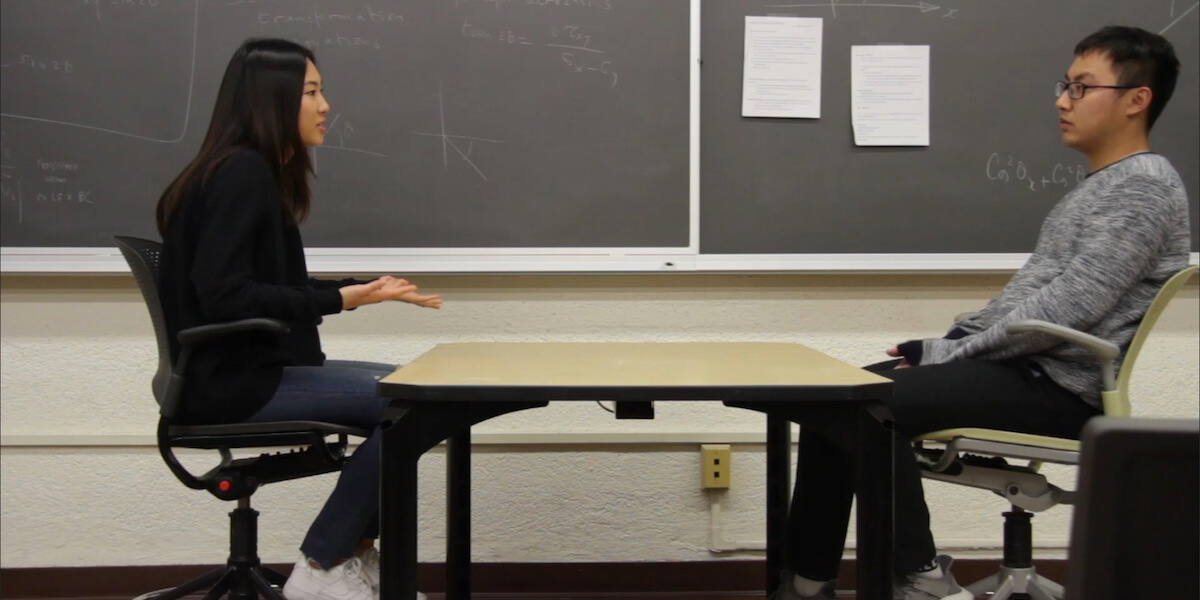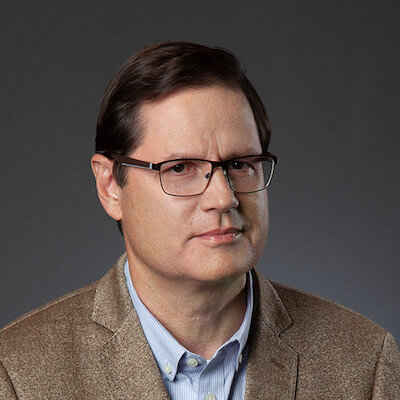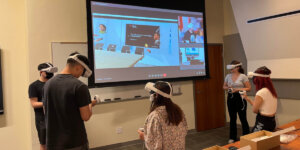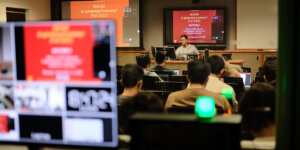
Students “speed date” in Elisabeth Arnold Weiss’s Writing 340 class (Photo/Reeves Gift)
The scene: two 20-somethings sit across a small table, gently smiling at one another.
One says: “Hi, I’m Michelle. I’m a junior studying engineering. I love international travel. I’ve been all over Europe and Asia and have family in China. Have you ever been overseas?”
The other leans forward: “Hi, Michelle! My name is Adam, and I’m a senior at USC. I absolutely love to travel. I’ve been to England, France and Italy but never to Asia, although I’m interested. Seems like we have a lot in common.”
A speed dating event? A random meeting?

Elisabeth Arnold Weiss (Photo/Kevin Lynch)
No, this meeting took place in a classroom at USC Viterbi, where Elisabeth Arnold Weiss, associate professor of technical communication practice, uses improv in her advanced writing course, Writing 340.
Over the past eight years, scores of USC Viterbi School of Engineering students, as well as non-engineering majors, have learned how to tap into their creative selves by participating in improvisational sessions held every semester in Engineering Writing Program (EWP) classes. In the process, students have “become more confident, more comfortable with extemporaneous tasks, and better communicators,” Weiss said.
And perhaps with a bit more fun.
“I really enjoyed the improv sessions. They were really a lot of fun and brought us all closer together,” said Jose Ruiz, a recent electrical engineering graduate and former treasurer of the USC chapter of the Society of Hispanic Professional Engineers. “I can go through an entire semester without speaking to my classmates. Thanks to these improv classes, I interacted with the people in my 340 class and even said ‘hi’ to many of them outside of the course.”
Games People Play
The improv classes, led by instructors from the USC School of Dramatic Arts, have engineering students – typcially stereotyped as sober and serious – playing the “Game of Ninja,” in which students stand in a circle, assume a martial arts stance, and try remain the last ninja standing by touching one another’s forearms while preventing classmates from karate chopping theirs.
In speed dating, on the other hand, participants endeavor to intrigue one another. Other exercises include students passing imaginary balls to one another and striking their favorite superhero poses, “based on their own gifts,” according to Debra De Liso, who has taught USC Viterbi students improv for nearly a decade.

Debra De Liso (Photo/Anette Puskas)
The director of over 500 original plays, an actress, and the voice of Raszagal and the Valkyrie Pilot in the popular video game, “StarCraft,” De Liso said her overarching goal is to encourage students to “use the part of their brains where they can tap into their child-like wonder.”
Added De Liso: “I want them to dare to be foolish and silly because out of that may come some brilliant idea,”
“I want them to dare to be foolish and silly because out of that may come some brilliant idea.”
More important, engineering students who participate in the improv classes develop communication skills that will help them professionally, said Martha Jane Townsend, a Writing 340 instructor.
The exercises, she said, helps students “loosen up” and relax. By learning to embrace spontaneity and even the occasional mistake, she said, they become more effective and less scripted communicators. “Exposing more of their humanistic side provides a much better connection with the audience,” Townsend said. “Improv also frees them up to be imperfect, which is good.”
Improv helps students also become better collaborators, an invaluable skill as engineers increasingly work on interdisciplinary teams that solve big problems. In one of the in-class exercises, students stand in a circle and take turns contributing a sentence or two to a made up story. That “yes, and . . .” mindset, that openness to new ideas, could pay big dividends for the future engineers.
“When another person has an idea, if our impulse is to say ‘no,’ then it shuts the conversation down,” Townsend said. “However, if we say ‘yes, that’s an interesting idea,’ then we engage in the addition of ideas rather than the silencing of ideas. Simple math suggests that if we say ‘yes, and,’ we are likely to find one or 10 or 500 good ideas, but if we say ‘no,’ we’ll get zero.”
The marriage of engineering and improv reflects Dean Yannis C. Yortsos’s belief that only through interdisciplinary collaboration can society solve its major challenges. He terms this as “Engineering+.”
“Today, problem solving and innovation are not the domains of one discipline or one people, one geographic area,” said Yortsos, whose office underwrites the hiring of dramatic arts instructors for the Writing 340 improv sessions. “For the best global, social and economic solutions, diversity of thought, opinions, education, and experience matter. They are in fact necessary.”
Alan Alda & Mike Henry
The improv classes have their roots in a collaboration about a decade ago among “M*A*S*H” actor Alan Alda; K.C. Cole, a professor at the USC Annenberg School for Communication and Journalism and former Los Angeles Times science reporter; and EWP Director Steve Bucher. The trio decided that Alda would coach a group of USC Viterbi engineering students in a variety of techniques used in comedy in theater.

Steve Bucher (Photo/Jeffrey Fiterman)
Thirteen students gave short presentations on their research. Then, they participated in several improv exercises, including pretending to walk on jiggly Jell-O. After their session with Alda, the students again gave short talks, only this time they exuded confidence and spoke like pros, Bucher said.
A year later, Weiss, the EWP professor, took the baton. In 2010, she invited her childhood friend, Mike Henry, to come to her class. Henry, a producer, writer, and the voice of Cleveland Brown on “Family Guy” and co-creator of “The Cleveland Show,” regaled students with stories about the creative process and his Hollywood experiences. When he improvised sketches and characters’ voices, he completely won the class over.
Why not, Weiss thought, make improv a part of the Writing 340 course?
In 2011, Weiss reached out to De Liso, the playwright and improv teacher, to teach her writing classes once a semester. Soon thereafter, the pair began developing and refining material for what would become the Improv for Engineers program.
Weiss’s initial improv classes went so well that other professors began adding them to their courses. By 2017, the school made the Improv for Engineers program an “embedded innovation” in the EWP curriculum, and almost all Writing 340 teachers now devote two sections a semester to improv, with the first focused on confidence building and individual speaking and the second dedicated to team building.
“Through improv, students across the board have shown improvement in the delivery of the speeches, created a stronger rapport with their classmates, and have built confidence in their ability to engage their audience through multiple modes of communication,” said Weiss, the recent recipient of the USC Viterbi Innovative Teaching Award.
As one of the handful of engineering writing programs in the nation to embed improv in the curriculum, USC Viterbi provides its students with the opportunity to acquire interpersonal abilities that set them apart from their peers, EWP Director Bucher said.
“The so-called ‘soft’ skills are incredibly important in developing well-rounded engineers – ones that are more suited to leadership positions and better suited to deal with people from other disciplines,” he said. “I think it’s vital to their development as engineers and innovators.”
Published on October 28th, 2019
Last updated on October 30th, 2019









